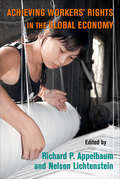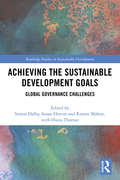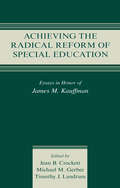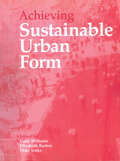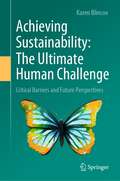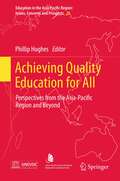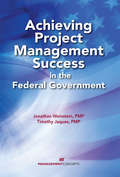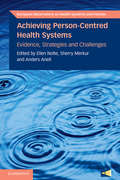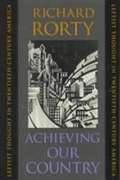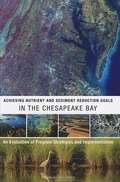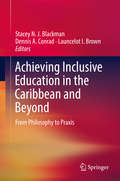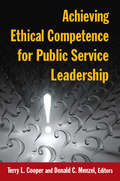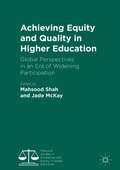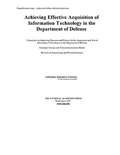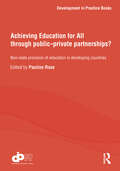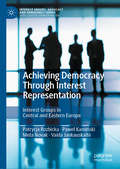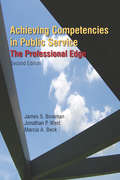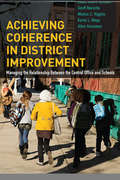- Table View
- List View
Achieving Workers' Rights in the Global Economy
by Richard Appelbaum Nelson LichtensteinThe world was shocked in April 2013 when more than 1,100 garment workers lost their lives in the collapse of the Rana Plaza factory complex in Dhaka. It was the worst industrial tragedy in the two-hundred-year history of mass apparel manufacture. This so-called accident was, in fact, just waiting to happen, and not merely because of the corruption and exploitation of workers so common in the garment industry. In Achieving Workers' Rights in the Global Economy, Richard P. Appelbaum and Nelson Lichtenstein argue that such tragic events, as well as the low wages, poor working conditions, and voicelessness endemic to the vast majority of workers who labor in the export industries of the global South arise from the very nature of world trade and production.Given their enormous power to squeeze prices and wages, northern brands and retailers today occupy the commanding heights of global capitalism. Retail-dominated supply chains—such as those with Walmart, Apple, and Nike at their heads—generate at least half of all world trade and include hundreds of millions of workers at thousands of contract manufacturers from Shenzhen and Shanghai to Sao Paulo and San Pedro Sula. This book offers an incisive analysis of this pernicious system along with essays that outline a set of practical guides to its radical reform.Contributors: Mark Anner, Penn State University; Richard P. Appelbaum, University of California, Santa Barbara; Jennifer Bair, University of Colorado Boulder; Renato Bignami, labor inspector, Brazil; Jeremy Blasi, UNITE HERE Local 11, Los Angeles, and Penn State; Anita Chan, Australian National University; Jenny Chan, University of Oxford; Jill Esbenshade, San Diego State University; Gary Gereffi, Duke University; Jeff Hermanson, International Union League for Brand Responsibility; Jason Kibbey, Sustainable Apparel Coalition; Nelson Lichtenstein, University of California, Santa Barbara; Xubei Luo, World Bank; Anne Caroline Posthuma, International Labour Organization; Scott Nova, Worker Rights Consortium; Ngai Pun, Hong Kong Polytechnic University; Katie Quan, University of California, Berkeley; Brishen Rogers, Temple University; Robert J. S. Ross, Clark University; Mark Selden, Cornell University and New York University; Chris Wegemer, Santa Barbara, California
Achieving the Sustainable Development Goals: Global Governance Challenges (Routledge Studies in Sustainable Development)
by Simon Dalby Susan Horton Rianne Mahon Diana ThomazThis book draws on the expertise of faculty and colleagues at the Balsillie School of International Affairs to both locate the Sustainable Development Goals (SDGs) as a contribution to the development of global government and to examine the political-institutional and financial challenges posed by the SDGs. The contributors are experts in global governance issues in a broad variety of fields ranging from health, food systems, social policy, migration and climate change. An introductory chapter sets out the broad context of the governance challenges involved, and how individual chapters contribute to the analysis. The book begins by focusing on individual SDGs, examining briefly the background to the particular goal and evaluating the opportunities and challenges (particularly governance challenges) in achieving the goal, as well as discussing how this goal relates to other SDGs. The book goes on to address the broader issues of achieving the set of goals overall, examining the novel financing mechanisms required for an enterprise of this nature, the trade-offs involved (particularly between the urgent climate agenda and the social/economic goals), the institutional arrangements designed to enable the achievement of the goals and offering a critical perspective on the enterprise as a whole. Achieving the Sustainable Development Goals makes a distinctive contribution by covering a broad range of individual goals with contributions from experts on governance in the global climate, social and economic areas as well as providing assessments of the overall project – its financial feasibility, institutional requisites, and its failures to tackle certain problems at the core. This book will be of great interest to scholars and students of international affairs, development studies and sustainable development, as well as those engaged in policymaking nationally, internationally and those working in NGOs.
Achieving the Radical Reform of Special Education: Essays in Honor of James M. Kauffman
by AntonioAs a tribute to scholar and mentor James M. Kauffman and his prodigious influence on the education of children and youth with disabilities, Achieving the Radical Reform of Special Education highlights and examines issues central to the continued growth and maturation of the field of special education. This impressive collection features the issues Kauffman has raised pointedly and repeatedly in his writing over the past three decades. With contributions by prominent scholars, essays throughout the book provide a valuable synopsis of the status of special education and its progress toward the achievement of radical reform at the outset of the 21st century. The volume is divided into four sections, corresponding to the following themes:1) recognizing and responding to individual differences among special education students; 2) repairing and elaborating the historical, philosophical, and legal foundations of special education practice; 3) strengthening the field’s empirical base; and4) confronting problems of advocacy and reform in special education. Chapters within each section discuss the status of the field, its progress, pitfalls, and promising subsequent steps. Achieving the Radical Reform of Special Education is intended for scholars, policy makers, and graduate students in special education and associated disciplines who seek to improve schools and to improve the education of students whose behavior and exceptional learning needs prevent their academic and social development.
Achieving Sustainable Urban Form
by Katie Williams Elizabeth Burton Mike JenksAchieving Sustainable Urban Form represents a major advance in the sustainable development debate. It presents research which defines elements of sustainable urban form - density, size, configuration, detailed design and quality - from macro to micro scale. Case studies from Europe, the USA and Australia are used to illustrate good practice within the fields of planning, urban design and architecture.
Achieving Sustainability: Critical Barriers and Future Perspectives
by Karen BlincoeThe book provides an assessment of whether sustainability is realizable in the current societal framework. What are the challenges and the barriers - and what are the levers necessary to meet and overcome them?Through a revision of the essence of sustainability the book provides an opportunity to understand the deeper level of the radical change that sustainability represents, and the resistance that is preventing its realization.To build the argument the sustainable development model is compared with current development theories as well as alternative solutions based on utopian models of the past. The book assesses the results that can be achieved within the current systemic framework, based on case stories. It outlines the limitations to sustainability, pointing out and defining the multiple, cross-sectoral and systemic barriers that hinder the transition.Finally, the book offers perspectives on achieving a sustainable future, encompassing the impacts from recent events including the pandemic as well as the multiple mitigation and transition initiatives undertaken globally.Brian Goodwin's QuoteLike the caterpillar that wraps itself up in its silken swaddling bands prior to its metamorphosis into a butterfly, we have wrapped ourselves in a tangled skin from which we can emerge only by going through a similarly dramatic transformation.
Achieving Regulatory Excellence
by Cary Coglianese Jim EllisWhether striving to protect citizens from financial risks, climate change, inadequate health care, or the uncertainties of the emerging "sharing” economy, regulators must routinely make difficult judgment calls in an effort to meet the conflicting demands that society places on them.Operating within a political climate of competing demands, regulators need a lodestar to help them define and evaluate success. Achieving Regulatory Excellence provides that direction by offering new insights from law, public administration, political science, sociology, and policy sciences on what regulators need to do to improve their performance.Achieving Regulatory Excellence offers guidance from leading international experts about how regulators can set appropriate priorities and make sound, evidence-based decisions through processes that are transparent and participatory. With increasing demands for smarter but leaner government, the need for sound regulatory capacity-for regulatory excellence-has never been stronger.
Achieving Quality Education for All: Perspectives from the Asia-Pacific Region and Beyond (Education in the Asia-Pacific Region: Issues, Concerns and Prospects #20)
by Phillip HughesDue to the development of the international Education for All and Education for Sustainable Development movements, for which UNESCO is the lead agency, there has been an increasing emphasis on the power of education and schooling to help build more just and equitable societies. Thus giving everyone the opportunity to develop their talents to the full, regardless of characteristics such as gender, socio-economic status, ethnicity, religious persuasion, or regional location. As enshrined in the United Nations Declaration on Human Rights over five decades ago, everyone has the right to receive a high quality and relevant education. In order to try to achieve this ideal, many countries are substantially re-engineering their education systems with an increasing emphasis on promoting equity and fairness, and on ensuring that everyone has access to a high quality and relevant education. They are also moving away from the traditional outlook of almost exclusively stressing formal education in schools as the most valuable way in which people learn, to accepting that important and valuable learning does not just occur in formal, dedicated education institutions, but also through informal and non-formal means. Thus learning is both lifelong and life-wide. This book brings together the experience and research of 40 recognised and experienced opinion leaders in education around the world. The book investigates the most effective ways of ensuring the UNESCO aim of effective education for all people in the belief that not only should education be a right for all, but also that education and schooling has the potential to transform individual lives and to contribute to the development of more just, humane and equitable societies.
Achieving Project Management Success in the Federal Government
by Jonathan Weinstein Pmp Timothy Jacques PmpGain Valuable Insight into the Government's Project Management Best Practices!Although project management is not new to the federal government, the discipline has taken on renewed importance in the face of the ever-increasing size, complexity, and number of mission-critical projects being undertaken by every branch and agency. This book addresses the key facets of project management, from organization and structure to people and process. A variety of government entities share their best practices in areas including leadership, technology, teams, communication, methodology, and performance management.Based on research and interviews with a wide range of project managers, Achieving Project Management Success in the Federal Government presents a realistic cross section of the project management discipline in the largest single enterprise in the world—the U.S. federal government.
Achieving Person-Centred Health Systems: Evidence, Strategies and Challenges (European Observatory on Health Systems and Policies)
by Ellen Nolte Sherry Merkur Anders AnellThe idea of person-centred health systems is widely advocated in political and policy declarations to better address health system challenges. A person-centred approach is advocated on political, ethical and instrumental grounds and believed to benefit service users, health professionals and the health system more broadly. However, there is continuing debate about the strategies that are available and effective to promote and implement 'person-centred' approaches. This book brings together the world's leading experts in the field to present the evidence base and analyse current challenges and issues. It examines 'person-centredness' from the different roles people take in health systems, as individual service users, care managers, taxpayers or active citizens. The evidence presented will not only provide invaluable policy advice to practitioners and policymakers working on the design and implementation of person-centred health systems but will also be an excellent resource for academics and graduate students researching health systems in Europe.
Achieving Peace in Northern Mali: Past Agreements, Local Conflicts, and the Prospects for a Durable Settlement
by Stephanie Pezard Michael ShurkinThis report examines the prospects for stabilization in Mali following the political and military crisis that began in 2012. To this end, it examines Mali's peace settlements since the early 1990s to identify flaws and successes. The report also explores whether Mali's neighbor Niger owes its current stability to a more favorable context, shrewd policies, or sheer luck, and whether it might offer a model of resilience for Mali.
Achieving Our Country: Leftist Thought in Twentieth-Century America
by Richard RortyMust the sins of America's past poison its hope for the future? Lately the American Left, withdrawing into the ivied halls of academe to rue the nation's shame, has answered yes in both word and deed. In Achieving Our Country, one of America's foremost philosophers challenges this lost generation of the Left to understand the role it might play in the great tradition of democratic intellectual labor that started with writers like Walt Whitman and John Dewey. How have national pride and American patriotism come to seem an endorsement of atrocities--from slavery to the slaughter of Native Americans, from the rape of ancient forests to the Vietnam War? Achieving Our Country traces the sources of this debilitating mentality of shame in the Left, as well as the harm it does to its proponents and to the country. At the center of this history is the conflict between the Old Left and the New that arose during the Vietnam War era. Richard Rorty describes how the paradoxical victory of the antiwar movement, ushering in the Nixon years, encouraged a disillusioned generation of intellectuals to pursue "High Theory" at the expense of considering the place of ideas in our common life. In this turn to theory, Rorty sees a retreat from the secularism and pragmatism championed by Dewey and Whitman, and he decries the tendency of the heirs of the New Left to theorize about the United States from a distance instead of participating in the civic work of shaping our national future. In the absence of a vibrant, active Left, the views of intellectuals on the American Right have come to dominate the public sphere. This galvanizing book, adapted from Rorty's Massey Lectures of 1997, takes the first step toward redressing the imbalance in American cultural life by rallying those on the Left to the civic engagement and inspiration needed for "achieving our country."
Achieving Nutrient and Sediment Reduction Goals in the Chesapeake Bay: An Evaluation of Program Strategies and Implementation
by The National Academy of SciencesThe Chesapeake Bay is North America's largest and most biologically diverse estuary, as well as an important commercial and recreational resource. However, excessive amounts of nitrogen, phosphorus, and sediment from human activities and land development have disrupted the ecosystem, causing harmful algae blooms, degraded habitats, and diminished populations of many species of fish and shellfish. In 1983, the Chesapeake Bay Program (CBP) was established, based on a cooperative partnership among the U. S. Environmental Protection Agency (EPA), the state of Maryland, and the commonwealths of Pennsylvania and Virginia, and the District of Columbia, to address the extent, complexity, and sources of pollutants entering the Bay. In 2008, the CBP launched a series of initiatives to increase the transparency of the program and heighten its accountability and in 2009 an executive order injected new energy into the restoration. In addition, as part of the effect to improve the pace of progress and increase accountability in the Bay restoration, a two-year milestone strategy was introduced aimed at reducing overall pollution in the Bay by focusing on incremental, short-term commitments from each of the Bay jurisdictions. The National Research Council (NRC) established the Committee on the Evaluation of Chesapeake Bay Program Implementation for Nutrient Reduction in Improve Water Quality in 2009 in response to a request from the EPA. The committee was charged to assess the framework used by the states and the CBP for tracking nutrient and sediment control practices that are implemented in the Chesapeake Bay watershed and to evaluate the two-year milestone strategy. The committee was also to assess existing adaptive management strategies and to recommend improvements that could help CBP to meet its nutrient and sediment reduction goals. The committee did not attempt to identify every possible strategy that could be implemented but instead focused on approaches that are not being implemented to their full potential or that may have substantial, unrealized potential in the Bay watershed. Because many of these strategies have policy or societal implications that could not be fully evaluated by the committee, the strategies are not prioritized but are offered to encourage further consideration and exploration among the CBP partners and stakeholders.
Achieving Nuclear Ambitions
by Jacques E. C. HymansDespite the global spread of nuclear hardware and knowledge, at least half of the nuclear weapons projects launched since 1970 have definitively failed, and even the successful projects have generally needed far more time than expected. To explain this puzzling slowdown in proliferation, Jacques E. C. Hymans focuses on the relations between politicians and scientific and technical workers in developing countries. By undermining the workers' spirit of professionalism, developing country rulers unintentionally thwart their own nuclear ambitions. Combining rich theoretical analysis, in-depth historical case studies of Iraq, China, Yugoslavia and Argentina and insightful analyses of current-day proliferant states, Achieving Nuclear Ambitions develops a powerful new perspective that effectively counters the widespread fears of a coming cascade of new nuclear powers.
Achieving Inclusive Education in the Caribbean and Beyond: From Philosophy to Praxis
by Stacey N. Blackman Dennis A. Conrad Launcelot I. BrownThis book offers an international perspective of philosophical, conceptual and praxis-oriented issues that impinge on achieving education for all students. It sheds light on the historical, systemic, structural, organizational, and attitudinal barriers that continue to be antithetical to the philosophy and practice of inclusive education within the Caribbean. The first section of the book examines how globalized views of inclusion informed by philosophical ideas from the North have influenced and continue to influence the equity in education agenda in the region. The second section considers how exclusion and marginalization still occur across selected Caribbean islands. It provides both quantitative and qualitative data about the nature and experience of exclusion in selected Caribbean islands, the UK and USA. The third section tackles the practical realities of transforming education systems in the Caribbean for inclusion. In particular, it identifies teacher practices as the main site of interrogation that needs to be tackled if inclusion is to be successful. The fourth and final section examines the contribution of principals and exemplars to the development and advocacy for inclusive education. It discusses how educational leadership is understood, as well as the role of school principals in making inclusion a reality in schools, the challenges experienced and the qualities of education leaders.
Achieving Human Rights
by Richard FalkRichard Falk once again captures our attention with a nuanced analysis of what we need to do - at the personal level as well as state actions - to refocus our pursuit of human rights in a post-9/11 world. From democratic global governance, to the costs of the Iraq War, the preeminent role of the United States in the world order to the role of individual citizens of a globalized world, Falk stresses the moral urgency of achieving human rights. In elegant simplicity, this book places the priority of such an ethos in the personal decisions we make in our human interactions, not just the activities of government institutions and non-governmental organizations. Falk masterly weaves together such topics as the Iraq War, U.S. human rights practices and abuses, humanitarian intervention, the rule of law, responses to terrorism, genocide in Bosnia, the Pinochet trial, the Holocaust, and information technology to create a moral tapestry of world order with human rights at the center.
Achieving Ethical Competence for Public Service Leadership
by Terry L. Cooper Donald C. MenzelThis book shows students entering the public service as well as professionals in the field how to become ethically competent to provide the leadership needed to advance the public interest. The book doesn't just talk about ethics. The contributors describe how ethical competence should guide organizational conduct. All chapters are original, and written by experts in the PA field for this book.
Achieving Equity and Quality in Higher Education: Global Perspectives in an Era of Widening Participation (Palgrave Studies in Excellence and Equity in Global Education)
by Mahsood Shah Jade McKayAcross the world, higher education is witnessing exponential growth in both student participation and types of educational providers. One key phenomenon of this growth is an increase in student diversity: governments are widening access to higher education for students from traditionally underrepresented groups. However, this raises questions about whether this rapid growth may in face compromise academic quality. This book presents case studies of how higher education institutions in diverse countries are maintaining academic excellence while increasing the access and participation of students from historically underrepresented backgrounds. Including case studies spanning four continents, the authors and editors examine whether increasing widening participation positively impacts upon academic quality. This volume will be of interest and value to students and scholars of global higher education, representation and participation in education, and quality in higher education.
Achieving Environmental Sustainability in the Sports Sector: Nature Means That Future (SpringerBriefs in Applied Sciences and Technology)
by Ahmet Atalay Biruta ŠvagždienėThis book explores the previously overlooked negative environmental impact of the sports industry, with a particular emphasis on the carbon footprint of sports facilities and organizations. The authors provide a comprehensive assessment of sustainable development goals, economic, social, and environmental sustainability concepts. They reveal the significant negative effects that the sports sector has on the environment and examine the policies implemented by stakeholders in the industry.The book also explores a case study of the legal policies implemented by the Lithuanian government to reduce the environmental impact of sports. The authors present practical suggestions for environmentally-friendly sports management, supported by examples presented with figures, pictures, and tables.This book fills a gap in the literature, offering suggestions and comments to enrich the practices of stakeholders in the sports industry. It provides an opportunity to make a positive difference for the environment while advancing the field of sports management.
Achieving Environmental Justice: A Cross-National Analysis
by Karen BellEnvironmental justice aspires to a healthy environment for all, as well as fair and inclusive processes of environmental decision-making. In order to develop successful strategies to achieve this, it is important to understand the factors that shape environmental justice outcomes. This optimistic, accessible and wide-ranging book contributes to this understanding by assessing the extent of, and reasons for, environmental justice/injustice in seven diverse countries - United States, Republic of Korea (South Korea), United Kingdom, Sweden, China, Bolivia and Cuba. Factors discussed include: race and class discrimination; citizen power; industrialisation processes; political-economic context; and the influence of dominant environmental discourses. In particular, the role of capitalism is critically explored. Based on over a hundred interviews with politicians, experts, activists and citizens of these countries, this is a compelling analysis aimed at all academics, policy-makers and campaigners who are engaged in thinking or action to address the most urgent environmental and social issues of our time.
Achieving Effective Acquisition of Information Technology in the Department of Defense
by National Research Council of the National AcademiesIn the military, information technology (IT) has enabled profound advances in weapons systems and the management and operation of the defense enterprise. A significant portion of the Department of Defense (DOD) budget is spent on capabilities acquired as commercial IT commodities, developmental IT systems that support a broad range of warfighting and functional applications, and IT components embedded in weapons systems. The ability of the DOD and its industrial partners to harness and apply IT for warfighting, command and control and communications, logistics, and transportation has contributed enormously to fielding the world's best defense force. However, despite the DOD's decades of success in leveraging IT across the defense enterprise, the acquisition of IT systems continues to be burdened with serious problems. To address these issues, the National Research Council assembled a group of IT systems acquisition and T&E experts, commercial software developers, software engineers, computer scientists and other academic researchers. The group evaluated applicable legislative requirements, examined the processes and capabilities of the commercial IT sector, analyzed DOD's concepts for systems engineering and testing in virtual environments, and examined the DOD acquisition environment. The present volume summarizes this analysis and also includes recommendations on how to improve the acquisition, systems engineering, and T&E processes to achieve the DOD's network-centric goals.
Achieving Education for All through Public–Private Partnerships?: Non-State Provision of Education in Developing Countries (Development in Practice Books)
by Pauline RoseConcern for achieving Millennium Development Goals (MDGs) by 2015 has led to a focus on the role that non-state providers (NSPs) can offer in extending access and improving quality of basic services. While NSPs can help to fill a gap in provision to those excluded from state provision, recent growth in both for-profit and not-for-profit providers in developing countries has sometimes resulted in fragmentation of service delivery. To address this, attention is increasingly given in the education sector to developing ‘partnerships’ between governments and NSPs. Partnerships are further driven by the expectation that the state has the moral, social, and legal responsibility for overall education service delivery and so should play a role in facilitating and regulating NSPs.Even where the ultimate aim of both non-state providers and the state is to provide education of acceptable quality to all children, this book provides evidence from diverse contexts across Africa, South Asia, and Latin America to highlight the challenges in them partnering to achieve this. This book was published as a special issue of Development in Practice.
Achieving Dynamism in an Anaemic Europe
by Luigi PaganettoThis book explores the reasons behind Europe's poor performance in terms of overall growth and its progressively diminishing role in the global context. Recognizing that the big challenge is to restore confidence and hope in Europe, potential solutions are discussed. The volume comprises a selection of contributions to the XXVI Villa Mondragone International Economic Seminar (Rome, 2014), the most recent of a series of seminars that have provided outstanding scholars with an opportunity to discuss key topics in economic research. In recent years the persistence of high unemployment and low growth has increased the Euroscepticism that has targeted the euro and the Brussels bureaucracy. Readers will find this book a fascinating source of information on current thinking regarding topics such as European industrial policy, European governance, unemployment, the euro and competitiveness, trade and financial integration, the Transatlantic Trade and Investment Partnership, anticorruption policies, and energy and climate policies. In particular, it examines the structural reforms and commitment to development that will be required for Europe to become a region characterized by social justice, dynamism, and opportunities for all.
Achieving Democracy Through Interest Representation: Interest Groups in Central and Eastern Europe (Interest Groups, Advocacy and Democracy Series)
by Patrycja Rozbicka Paweł Kamiński Meta Novak Vaida JankauskaitėThis book assesses the quality of democracy through the study of organized interests in Central and Eastern Europe (CEE) since the collapse of communism in 1989 up to 2017. It offers a much-needed comprehensive look into formal interest representation in CEE countries and compares this with the model in Western democracies. Drawing on democratic theory and comparative analysis, the authors explore the effects of a legal framework, political as well as social contexts. The volume contributes to debates on the performance of young democracies in CEE, where scholars argue that there is a ‘democratic crisis’ and democratic fatigue while the interest group system is often labelled as weak and, in some cases, underdeveloped. Although great efforts have been made to deepen our understanding of interest organization and lobbying tools, the current literature fails to provide a comprehensive answer on the influence of unsupportive environments on population ecology. The case of CEE countries shows significant effects of political and social contexts on interest representation, stimulating a debate about the quality of democratic institutions following the collapse of communism.
Achieving Competencies in Public Service: The Professional Edge
by James S. Bowman Jonathan P. West Marcia A. BeckThe new context and character of public service - shifting values, entrepreneurship, information technology, and multi-sector careers - require a 'skills triangle' of technical, ethical, and leadership abilities. This concise and readable work focuses on these three essential skills, and describes what it means to be a consummate professional public servant. Essential reading for both professionals and students, "Achieving Competencies in Public Service: The Professional Edge" sets standards for anyone who conducts the public's business, and links them with performance management, human resource administration, and information technology skills. Filled with original illustrative examples, case studies, and exemplar profiles, the book is an ideal supplement for any introductory course in Public Administration.
Achieving Coherence in District Improvement: Managing the Relationship Between the Central Office and Schools
by Allen S. Grossman Geoff Marietta Karen L. Mapp Monica C. Higgins Susan Moore JohnsonAchieving Coherence in District Improvement focuses on a problem of practice faced by educational leaders across the nation: how to effectively manage the relationship between the central office and schools. The book is based on a study of five large urban districts that have demonstrated improvement in student achievement. The authors—all members of Harvard University’s Public Education Leadership Project (PELP)—argue that there is no “one best way” to structure the central office-school relationship. Instead, they say, what matters is whether district leaders effectively select and implement their strategy by achieving coherence among key elements and actors—the district’s environment, resources, systems, structures, stakeholders, and culture. The authors examine the five districts’ approaches in detail and point to a number of important findings. First, they emphasize that a clear, shared understanding of decision rights in key areas—academic programming, budgeting, and staffing—is essential to developing an effective central office-school relationship. Second, they stress the importance of building mutually supportive and trusting relationships between district leaders and principals. Third, they highlight the ways that culture and the external environment influence the relationship between the central office and schools. Each chapter also provides relevant “Lessons for Practice”—actionable takeaways—that educational leaders from any district can use successfully to improve the central office-school relationship.
